So, last week I started out talking about some edge-pushing music from Israel. This week that brings a bundle of nostalgia from Hatikvah Music in LA, just in time for the holidays.
 By the late 1950s, American Jews found themselves at home in the US as perhaps in no country since Spain almost 1000 years earlier. American pop musicians were singing Jewish pop and sacred music and creating hits. This collection documents a period, mostly from the late 1950s into the early 1960s where Jewish music was part of the pop gestalt as perhaps never before or since. Eartha Kitt's version of "Rumania, Rumania" is worth the CD all on its own, but other stars featured include Johnny Mathis, Andy Williams, Jackie Wilson (yes, that's really "Hava Nagila!"), and more. To make the CD worth ordering in this season, it includes opera star, Cantor Jan Peerce's "Kol Nidre." Jewish Soul. Tell Simon that you heard about it here on the KlezmerShack.
By the late 1950s, American Jews found themselves at home in the US as perhaps in no country since Spain almost 1000 years earlier. American pop musicians were singing Jewish pop and sacred music and creating hits. This collection documents a period, mostly from the late 1950s into the early 1960s where Jewish music was part of the pop gestalt as perhaps never before or since. Eartha Kitt's version of "Rumania, Rumania" is worth the CD all on its own, but other stars featured include Johnny Mathis, Andy Williams, Jackie Wilson (yes, that's really "Hava Nagila!"), and more. To make the CD worth ordering in this season, it includes opera star, Cantor Jan Peerce's "Kol Nidre." Jewish Soul. Tell Simon that you heard about it here on the KlezmerShack.
 The revelation of this set of reissues, however, is the woman that Hatikvah Music owner Simon Rutberg says "got me into Jewish music." I can hear where he is coming from. Sloan has an amazing voice, and this collection of Moishe Oisher classics still sounds fresh and exciting. I got hooked on the opening "Haggada in Song", fell into shul-going spirits with "Sheyiboney Beys Hamikdash," and perfectly captures the cross-over excitement of "Hassidic in America." Mimi Sloan / sings Moishe Oysher classics, another excellent re-issue from Hatikvah Music.
The revelation of this set of reissues, however, is the woman that Hatikvah Music owner Simon Rutberg says "got me into Jewish music." I can hear where he is coming from. Sloan has an amazing voice, and this collection of Moishe Oisher classics still sounds fresh and exciting. I got hooked on the opening "Haggada in Song", fell into shul-going spirits with "Sheyiboney Beys Hamikdash," and perfectly captures the cross-over excitement of "Hassidic in America." Mimi Sloan / sings Moishe Oysher classics, another excellent re-issue from Hatikvah Music.
 Even less familiar to me is this collection, Leo Fuld /sings his greatest Yiddish hits. Fuld was a Dutch singer who made a splash as a pop singer before WWII, and gradually incorporated more Yiddish and Hebrew into his act. After losing his family in the Holocaust, he stopped singing for several years while earning a reputation as a writer. He is perhaps best known for his translation of "Vi ahin zol ikh geyn" ("Where can I Go?"—you can hear the Johnny Mathis version of this hit on Jewish Soul, above.) His music remains incredibly popular in Europe and Israel. Time to break through again in the US?
Even less familiar to me is this collection, Leo Fuld /sings his greatest Yiddish hits. Fuld was a Dutch singer who made a splash as a pop singer before WWII, and gradually incorporated more Yiddish and Hebrew into his act. After losing his family in the Holocaust, he stopped singing for several years while earning a reputation as a writer. He is perhaps best known for his translation of "Vi ahin zol ikh geyn" ("Where can I Go?"—you can hear the Johnny Mathis version of this hit on Jewish Soul, above.) His music remains incredibly popular in Europe and Israel. Time to break through again in the US?
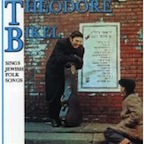 Before Tevye, Theo Bikel was leading the Yiddish wing of the great folk scare to great effect. In this first Elekra recording, he writes, "This is the first alum of Yiddish folklore I have recorded. I do not intend it to be my last." Theodore Bikel / sings Jewish folk songs captures the voice of an already vigorous, young Bikel, and many songs that we know think of as "classics," from "Kum aher du filozof," a classic "Homentashn," and a straight-forward "Lomir zich iberbeten" that eschews some of the art-song heaviness of later recordings by other artists Enjoy.
Before Tevye, Theo Bikel was leading the Yiddish wing of the great folk scare to great effect. In this first Elekra recording, he writes, "This is the first alum of Yiddish folklore I have recorded. I do not intend it to be my last." Theodore Bikel / sings Jewish folk songs captures the voice of an already vigorous, young Bikel, and many songs that we know think of as "classics," from "Kum aher du filozof," a classic "Homentashn," and a straight-forward "Lomir zich iberbeten" that eschews some of the art-song heaviness of later recordings by other artists Enjoy.
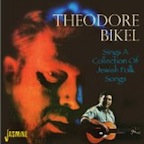 Bikel returns here for a second outing of Jewish folk favorites with arrangements by Fred Hellerman (one of the "Weavers"). Theodore Bikel / sings more Jewish folk songs may have strings surrounding the folk music, but you can still hear the "sing-along" on songs such as "Lomir alle zingen," or the personal connection between you and the singer on numbers such as "Unter a kleyn beymele" or "Papir iz doch veis."
Bikel returns here for a second outing of Jewish folk favorites with arrangements by Fred Hellerman (one of the "Weavers"). Theodore Bikel / sings more Jewish folk songs may have strings surrounding the folk music, but you can still hear the "sing-along" on songs such as "Lomir alle zingen," or the personal connection between you and the singer on numbers such as "Unter a kleyn beymele" or "Papir iz doch veis."
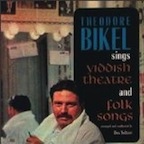 This final release from the Bikel '60s Elektra canon, Theodore Bikel / Sings Yiddish theatre and folk songs features a song familiar to all of us who fell in love with the recent Coen Brothers movie, A Serious Man, "Dem Milner's Treren." I'm also partial to his take on the always-timely "Dire Gelt."
This final release from the Bikel '60s Elektra canon, Theodore Bikel / Sings Yiddish theatre and folk songs features a song familiar to all of us who fell in love with the recent Coen Brothers movie, A Serious Man, "Dem Milner's Treren." I'm also partial to his take on the always-timely "Dire Gelt."
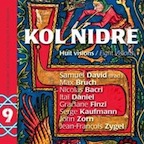 The High Holidays being upon us, I'd like to take a moment to acknowledge a fascinating collection of "Kol Nidre" recordings featuring composers/arrangers as diverse as Max Bruch and John Zorn, performed by a variety of French ensembles, Kol Nidre / Eight Visions. According to the liner notes (wonderfully detailed, in both French and English) these 8 recordings date from a concert organized by the French Liberal Jewish Union and the French Center for Jewish Music held on Nov 18 and 22, 2009, in the Synagogue of the rue Copernic, recording by radio station "France Musique." For lovers of 20th century Jewish nusakh, lovers of classical music, and anyone caught up in this season, this is a very special recording.
The High Holidays being upon us, I'd like to take a moment to acknowledge a fascinating collection of "Kol Nidre" recordings featuring composers/arrangers as diverse as Max Bruch and John Zorn, performed by a variety of French ensembles, Kol Nidre / Eight Visions. According to the liner notes (wonderfully detailed, in both French and English) these 8 recordings date from a concert organized by the French Liberal Jewish Union and the French Center for Jewish Music held on Nov 18 and 22, 2009, in the Synagogue of the rue Copernic, recording by radio station "France Musique." For lovers of 20th century Jewish nusakh, lovers of classical music, and anyone caught up in this season, this is a very special recording.
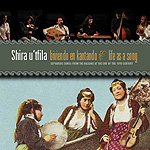 One of the most treasured groups to find me in recent years is a small band from the former Yugoslavia known as "Shira U'tfila." They perform traditional Sephardic songs, liturgical, life-cycle, and just plain folkish. Their most recent recording, Shira U'tfila / Life as a song (2010) focuses on the first available recordings of Sephardic repertoire from the likes of Haim Effendi and Victoria Hazan. The songs range from love songs to religious piyyutim, and the sound will be familiar to all lovers of Greek, Turkish, and similar music descended from the cultures of the Ottoman Empire. Better yet, the second disc in this two-disc set contains the original recordings against which the group's efforts may be judged! Like earlier recordings, this is not only extraordinary work, but is produced with love and wonderful notes. The music is also available as mp3 via iTunes and Amazon.com.
One of the most treasured groups to find me in recent years is a small band from the former Yugoslavia known as "Shira U'tfila." They perform traditional Sephardic songs, liturgical, life-cycle, and just plain folkish. Their most recent recording, Shira U'tfila / Life as a song (2010) focuses on the first available recordings of Sephardic repertoire from the likes of Haim Effendi and Victoria Hazan. The songs range from love songs to religious piyyutim, and the sound will be familiar to all lovers of Greek, Turkish, and similar music descended from the cultures of the Ottoman Empire. Better yet, the second disc in this two-disc set contains the original recordings against which the group's efforts may be judged! Like earlier recordings, this is not only extraordinary work, but is produced with love and wonderful notes. The music is also available as mp3 via iTunes and Amazon.com.
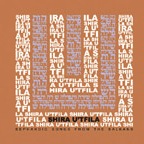 An earlier CD, Shira U'tfila / Sephardic Songs from the Balkans is available from the polish vendor, Orangeworld. This recording features the band playing with a variety of male and female soloists, and again, is produced in a beautiful package with copious notes. I would consider both "essential" and incredible pleasure.
An earlier CD, Shira U'tfila / Sephardic Songs from the Balkans is available from the polish vendor, Orangeworld. This recording features the band playing with a variety of male and female soloists, and again, is produced in a beautiful package with copious notes. I would consider both "essential" and incredible pleasure.
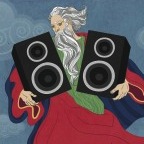 I would be extraordinarily remiss, with all this talk about compilation albums, in not mentioning an extraordinary homegrown compilation: the sampler from the 4th Annual Boston Jewish Music Festival, now available as a fundraiser for the Festival. It is a testament to the extraordinary quality and diversity of the festival that this collection stands on its own as an introduction to some of the best of contemporary Jewish music from old-timers, to young adults to kids. Artists range from my long-time favorites, the Lerner-Moguilevsky Duo, from Argentina, and the extraordinary, voice of Dutch artist Shura Lupovsky, to the Guy Mendilow Ensemble, Daniel Kahn, Ezekiel's Wheels (another hometown fave), the Josh Nelson Project, Electronica artists Stereo Sinai and Mazal, new Israeli sensation, Mika Karni's Kol Dodi, Zamir Choral of Boston, and best of all, live recordings from the 2012 headliner, Andy Statman. You can read more about the collection, and get your own copy (or the 2012 festival collection, should you prefer) from the festival's website. Hear O Israel / the 2013 Boston Jewish Music Sampler
I would be extraordinarily remiss, with all this talk about compilation albums, in not mentioning an extraordinary homegrown compilation: the sampler from the 4th Annual Boston Jewish Music Festival, now available as a fundraiser for the Festival. It is a testament to the extraordinary quality and diversity of the festival that this collection stands on its own as an introduction to some of the best of contemporary Jewish music from old-timers, to young adults to kids. Artists range from my long-time favorites, the Lerner-Moguilevsky Duo, from Argentina, and the extraordinary, voice of Dutch artist Shura Lupovsky, to the Guy Mendilow Ensemble, Daniel Kahn, Ezekiel's Wheels (another hometown fave), the Josh Nelson Project, Electronica artists Stereo Sinai and Mazal, new Israeli sensation, Mika Karni's Kol Dodi, Zamir Choral of Boston, and best of all, live recordings from the 2012 headliner, Andy Statman. You can read more about the collection, and get your own copy (or the 2012 festival collection, should you prefer) from the festival's website. Hear O Israel / the 2013 Boston Jewish Music Sampler
 By the late 1950s, American Jews found themselves at home in the US as perhaps in no country since Spain almost 1000 years earlier. American pop musicians were singing Jewish pop and sacred music and creating hits. This collection documents a period, mostly from the late 1950s into the early 1960s where Jewish music was part of the pop gestalt as perhaps never before or since. Eartha Kitt's version of "Rumania, Rumania" is worth the CD all on its own, but other stars featured include Johnny Mathis, Andy Williams, Jackie Wilson (yes, that's really "Hava Nagila!"), and more. To make the CD worth ordering in this season, it includes opera star, Cantor Jan Peerce's "Kol Nidre."
By the late 1950s, American Jews found themselves at home in the US as perhaps in no country since Spain almost 1000 years earlier. American pop musicians were singing Jewish pop and sacred music and creating hits. This collection documents a period, mostly from the late 1950s into the early 1960s where Jewish music was part of the pop gestalt as perhaps never before or since. Eartha Kitt's version of "Rumania, Rumania" is worth the CD all on its own, but other stars featured include Johnny Mathis, Andy Williams, Jackie Wilson (yes, that's really "Hava Nagila!"), and more. To make the CD worth ordering in this season, it includes opera star, Cantor Jan Peerce's "Kol Nidre."  The revelation of this set of reissues, however, is the woman that Hatikvah Music owner Simon Rutberg says "got me into Jewish music." I can hear where he is coming from. Sloan has an amazing voice, and this collection of Moishe Oisher classics still sounds fresh and exciting. I got hooked on the opening "Haggada in Song", fell into shul-going spirits with "Sheyiboney Beys Hamikdash," and perfectly captures the cross-over excitement of "Hassidic in America."
The revelation of this set of reissues, however, is the woman that Hatikvah Music owner Simon Rutberg says "got me into Jewish music." I can hear where he is coming from. Sloan has an amazing voice, and this collection of Moishe Oisher classics still sounds fresh and exciting. I got hooked on the opening "Haggada in Song", fell into shul-going spirits with "Sheyiboney Beys Hamikdash," and perfectly captures the cross-over excitement of "Hassidic in America."  Even less familiar to me is this collection,
Even less familiar to me is this collection,  Before Tevye, Theo Bikel was leading the Yiddish wing of the great folk scare to great effect. In this first Elekra recording, he writes, "This is the first alum of Yiddish folklore I have recorded. I do not intend it to be my last."
Before Tevye, Theo Bikel was leading the Yiddish wing of the great folk scare to great effect. In this first Elekra recording, he writes, "This is the first alum of Yiddish folklore I have recorded. I do not intend it to be my last."  Bikel returns here for a second outing of Jewish folk favorites with arrangements by Fred Hellerman (one of the "Weavers").
Bikel returns here for a second outing of Jewish folk favorites with arrangements by Fred Hellerman (one of the "Weavers").  This final release from the Bikel '60s Elektra canon,
This final release from the Bikel '60s Elektra canon,  The High Holidays being upon us, I'd like to take a moment to acknowledge a fascinating collection of "Kol Nidre" recordings featuring composers/arrangers as diverse as Max Bruch and John Zorn, performed by a variety of French ensembles,
The High Holidays being upon us, I'd like to take a moment to acknowledge a fascinating collection of "Kol Nidre" recordings featuring composers/arrangers as diverse as Max Bruch and John Zorn, performed by a variety of French ensembles,  One of the most treasured groups to find me in recent years is a small band from the former Yugoslavia known as "Shira U'tfila." They perform traditional Sephardic songs, liturgical, life-cycle, and just plain folkish. Their most recent recording,
One of the most treasured groups to find me in recent years is a small band from the former Yugoslavia known as "Shira U'tfila." They perform traditional Sephardic songs, liturgical, life-cycle, and just plain folkish. Their most recent recording,  An earlier CD,
An earlier CD,  I would be extraordinarily remiss, with all this talk about compilation albums, in not mentioning an extraordinary homegrown compilation: the sampler from the 4th Annual Boston Jewish Music Festival, now available as a fundraiser for the Festival. It is a testament to the extraordinary quality and diversity of the festival that this collection stands on its own as an introduction to some of the best of contemporary Jewish music from old-timers, to young adults to kids. Artists range from my long-time favorites, the Lerner-Moguilevsky Duo, from Argentina, and the extraordinary, voice of Dutch artist Shura Lupovsky, to the Guy Mendilow Ensemble, Daniel Kahn, Ezekiel's Wheels (another hometown fave), the Josh Nelson Project, Electronica artists Stereo Sinai and Mazal, new Israeli sensation, Mika Karni's Kol Dodi, Zamir Choral of Boston, and best of all, live recordings from the 2012 headliner, Andy Statman. You can read more about the collection, and get your own copy (or the 2012 festival collection, should you prefer) from the festival's website.
I would be extraordinarily remiss, with all this talk about compilation albums, in not mentioning an extraordinary homegrown compilation: the sampler from the 4th Annual Boston Jewish Music Festival, now available as a fundraiser for the Festival. It is a testament to the extraordinary quality and diversity of the festival that this collection stands on its own as an introduction to some of the best of contemporary Jewish music from old-timers, to young adults to kids. Artists range from my long-time favorites, the Lerner-Moguilevsky Duo, from Argentina, and the extraordinary, voice of Dutch artist Shura Lupovsky, to the Guy Mendilow Ensemble, Daniel Kahn, Ezekiel's Wheels (another hometown fave), the Josh Nelson Project, Electronica artists Stereo Sinai and Mazal, new Israeli sensation, Mika Karni's Kol Dodi, Zamir Choral of Boston, and best of all, live recordings from the 2012 headliner, Andy Statman. You can read more about the collection, and get your own copy (or the 2012 festival collection, should you prefer) from the festival's website.